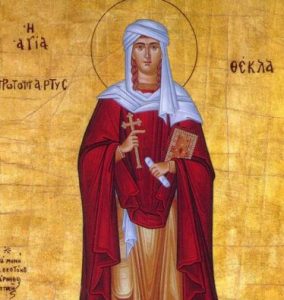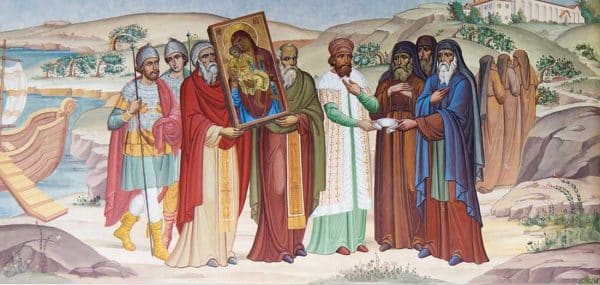Who was Saint Thecla
 Saint Thecla is a figure revered in early Christian tradition, known for her close association with Saint Paul and her remarkable story of faith, courage, and miraculous survival. According to ancient Christian texts, particularly the “Acts of Paul and Thecla,” which is part of the wider collection of apocryphal acts, Thecla was a young noblewoman from Iconium (present-day Konya, Turkey) who heard Paul’s preaching on chastity and was deeply moved by his message.
Saint Thecla is a figure revered in early Christian tradition, known for her close association with Saint Paul and her remarkable story of faith, courage, and miraculous survival. According to ancient Christian texts, particularly the “Acts of Paul and Thecla,” which is part of the wider collection of apocryphal acts, Thecla was a young noblewoman from Iconium (present-day Konya, Turkey) who heard Paul’s preaching on chastity and was deeply moved by his message.
The story recounts that upon hearing Paul, Thecla vowed to live a life of chastity, rejecting her betrothal to a man named Thamyris. Her decision led to a series of dramatic events, including being brought before the authorities by her own family and facing severe punishment for her faith and defiance of societal expectations. Despite being sentenced to death multiple times, Thecla miraculously survived each attempt, including being thrown into a pit of lions and being tied to a stake to be burned, with the narrative often attributing her survival to divine intervention.
Legacy and Veneration
After her ordeals, Thecla is said to have traveled to find Paul once again, receiving his blessing to preach the gospel. She then embarked on a mission, becoming an early Christian evangelist and healer. According to tradition, she settled in Seleucia (in modern-day Turkey), where she lived in a cave for many years, continuing her ministry until her death. The cave became a site of pilgrimage and is associated with numerous miracles.
Saint Thecla’s story is significant for several reasons. Firstly, it highlights the role of women in the early Christian movement, showcasing Thecla as a figure of strong faith and agency, who made significant sacrifices for her beliefs. Her story has been interpreted as an early example of Christian asceticism and has inspired many in the pursuit of a devout and celibate life.
She is venerated as a saint in the Eastern Orthodox, Oriental Orthodox, and some Western Christian traditions. Her feast day is celebrated on September 24 in the Orthodox Church and September 23 in the Catholic Church. Over the centuries, Saint Thecla has been the subject of numerous works of art, literature, and devotion, and her legacy continues to inspire Christians around the world.
Saint Thecla’s shrines and churches can be found across the Christian world, particularly in the regions of the Eastern Mediterranean. Her story, while not included in the canonical New Testament, remains an important part of Christian apocryphal literature and provides valuable insights into early Christian beliefs, practices, and the role of women within the faith.
